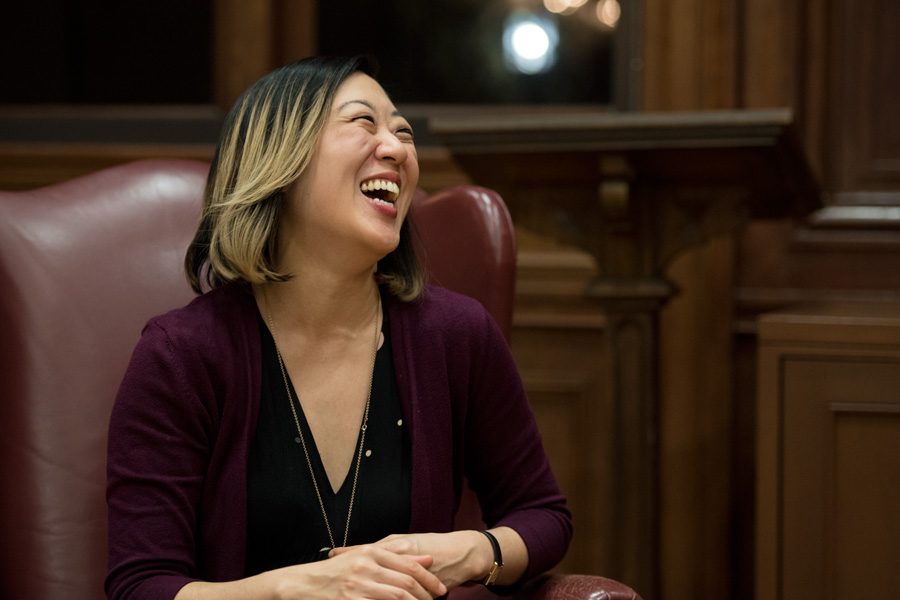Playwright Young Jean Lee discusses her experiences writing identity-based art
Claire Pak/The Daily Northwestern
Playwright Young Jean Lee speaks about her creative work and approach to identity politics. Lee addressed more than 50 people Monday in Harris Hall.
January 24, 2017
When deciding what to address in her work, playwright Young Jean Lee said she thinks of the worst play in the world she could possibly write.
“And then I force myself to write that play,” Lee said.
In a talk hosted jointly by the Theater Department and the Department of Radio, Television and Film at Harris Hall, the Korean-American playwright delved into some of her past work and her unique creative process to an audience of more than 50 people on Monday.
Lee confronts topics such as race and identity in her work, she said. When she was a student writing some of her first plays, she found herself trying too hard to imitate other playwrights. Her work was “derivative and horrible,” she said, but she was taught to simply keep writing until she found her own voice.
“That was a moment of huge discovery,” she said. “I had written something original because I had tricked myself into not being derivative. So I don’t think I could ever write the show that I most want to write, because that desire to imitate is just very strong within me.”
Lee also elaborated on her own writing process. She said she begins each play with no script, just a room of cast members. They can go through weeks and even months of just talking, she said, which allows her to better understand the experiences she hopes to write about.
Good identity-based work is not always “politically correct” and artists don’t always need to confine themselves to writing about their own identity, Lee said. But, it must accurately and respectfully portray those it represents, she said. Lee said directly interacting with the people she writes about is vital.
Her most recent play, “Straight White Men,” started when she sat down with a room full of the titular subjects to discuss their identities. For her 2009 play, “The Shipment,” she went through a similar process, collaborating with an all-black cast to create a show about black identity and stereotypes.
Lee encouraged students to be bold in the topics they address, but to make sure they do so with caution and run their ideas by other people.
“As an Asian-American person … I want to have a voice in how Asian-Americans are represented in somebody else’s play,” she said. “(Talking to people) always makes my project more interesting. It might require making some friends that you might not have, but that’s great.”
RTVF Prof. Thomas Bradshaw, who graduated from Brooklyn College’s master of fine arts program in playwriting with Lee, moderated the talk and commended her willingness to constantly reassess and critique her own work.
Bradshaw said he hopes his students are inspired to be committed to meticulous, high quality work, he told The Daily. He added that despite critical acclaim and commercial success, Lee will never stop rewriting her work if she is unhappy with it.
“(It’s) about being rigorous in your writing, about trying to be the best writer that you can be,” he said.
Bradshaw said the department has high regard for Lee’s work and assigns it to students regularly. He added that Lee has often connected with Northwestern students through email as well, responding to questions about her plays.
RTVF sophomore and playwriting student Chloe Fourte, who recently read one of Lee’s plays in class, was interested in her unconventional work and came to the event to learn more about her artistic approach.
“She’s doing things on her own accord, but being respectful,” Fourte said. “She’s pushing boundaries and provoking conversation in a way that is … doing more than just hearing yourself talk.”
Email: [email protected]
Twitter: @yvonneekimm












